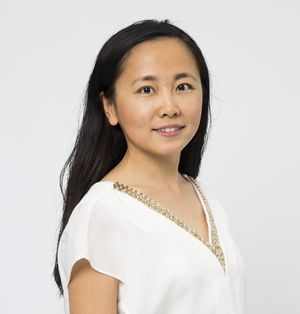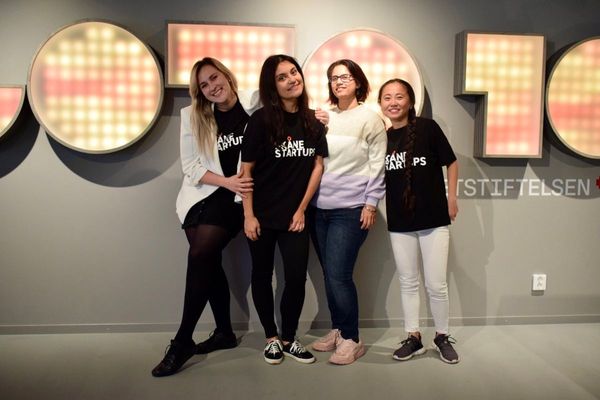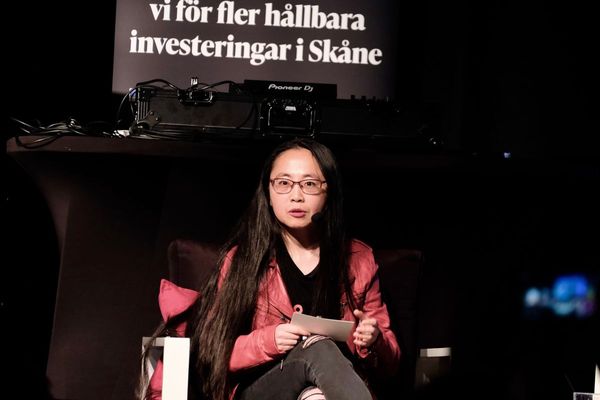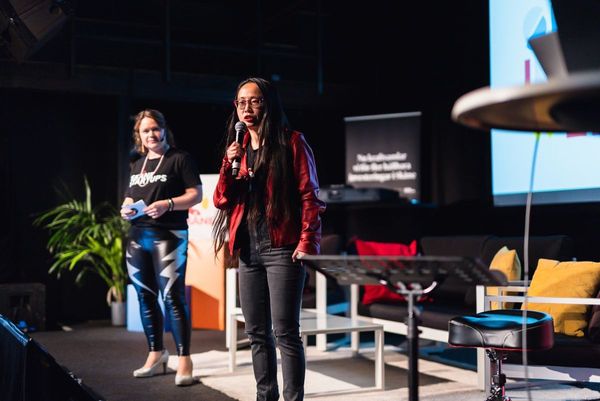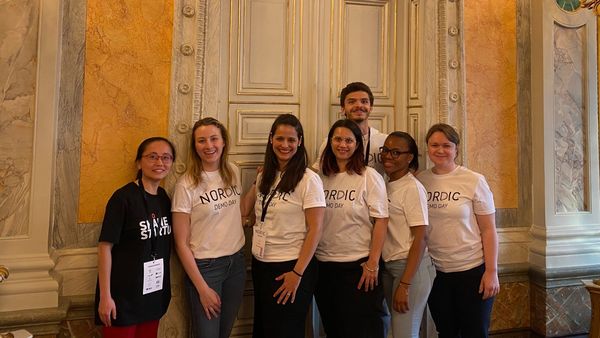Skåne Startups Founder Fika Friday is a series of events where we invite some of the highly influential founders from Skåne Region to share their experiences with our startup community.
On June 18th, we had our special guest Niclas Mollin, the Co-Founder and CEO of Occtoo. Occtoo is considered to be one of top ten most promising startups in Sweden for 2021. Within the first 6 months of year 2021, Occtoo accomplished monthly recurring revenue growth of 100% and amazing team growth of 114%.
Occtoo is an Experience Data Platform that fast forward how digital officers, marketers and developers create relevant customer experiences everywhere. With Occtoo you can easily unify all your experience data (transactional data, product data, customer data, content etc) and access it from one single place.
Watch the event recoding here
Niclas said that he started to hustle very early and began his career in telemarketing at a company called Lexicon. Always being a risk taker, he decided to take a new role in Stratiteq and eventually started a inRiver with his co-founders in the middle of financial crisis.
Though it was a challenging time to sell their solutions, their sharp judgement on the market trend and their grit allowed to grow the company into a million-dollar business.
He believed that the key to their success is to focus. He said:
Don't try to help every customer. Try to help them in what you believe that you are really good at.
He also suggested founders to ask these questions if they want to build a global company:
do we have a big enough problem? Can this be something that companies all over the world can use? Can we attract people all over the world to buy into this vision?
The early journey of inRiver
Q: You started your career as a key account manager. During your time as the VP of Sales and Marketing at Stratiteq Sweden AB, the company grew from less than 10 people to 55 people during 2005-2008. How did this "growth & scaling up" experience help you in your entrepreneurial journey?
I've always been curious and a risk-taker. Stratiteq was quite a big step for me, personally. We (my family) just bought our first apartment. I worked as a key account at Ementor and made good money in sales. But I was not challenged in this role. I got in contact with Frederick, one of the founders of Stratiteq. He talked about this great vision of building this consultancy company on Microsoft technology in Malmö. And I met the rest of the founding team. They are really good guys but there was no one doing sales. So, I joined them.
It was quite easy because we went around to companies and asked about their problems and some problems matched the competency of the consultants we had. And if not, we just went to another company. So, that was quite easy for us since we had a foundation in Microsoft technology and we based our offering on that. And we approached regional companies.
It was very local. Our office was in Malmö, and we hired in Malmö. That was a big difference from other companies that were going more international. But, of course, it was a learning curve. That opportunity was the entry point to inRiver where me, Jimmy and Daniel, started working together at Stratiteq.
Jimmy was a consultancy manager, I was a sales manager, and Daniel was a sharp developer. So, it segued into inRiver, which was called Meta Soft at the time. I met the first investor at MetaSoft (inRiver). He explained that they wanted to build a product company. And me, Jimmy and Daniel, have created something similar, but more as a consultancy product for companies.
Once again, going back to being a risk-taker, I felt like this is a really cool opportunity to be part of a product company early on. What does it mean to build a product company compared to a consultancy company? What does it mean to have a global arena? It was a big opportunity just to join that company.
So, Jimmy and I talked back and forth, is this the next thing for us? Yes, it was! We joined the team of inRiver. At the time, they were doing much more than PIM (Product Information Management). And that was what we decided to do together to focus on one product instead of many. We streamlined and focused on problem to solve.
Q: Many of the audience know you as the co-founder and CEO of inRiver, a market leader for simplifying Product Information Management. Take us back to the early journey of inRiver. What made you decide to start inRiver in the middle of the financial crisis?
My wife was really mad at me at the time because she didn't feel like I understood that we had small kids. There's a time when you take risks, and there's a time when you don't do it.
The company itself already existed, and what we did was that we pivoted one solution to another. When Jimmy and I joined the company, we pivoted from a multi-product company to one-product company. That's what Product Information Management. We realised that there were a lot of things we needed to do. Good or bad timing? The timing was definitely harder because we couldn't do any sales.
But on the good side, we got some time to downsize. The company at the time had 4 locations. We decided the headquarter is Malmö. We down sized and we started to build again. So, that was the background. So, the timing was terrible. It took us a couple of years to get going. We started to get momentum around 2010.
This goes back to 2008 when we saw a big trend. It was very early on e-commerce. Companies sold through catalogues and retails. But we saw that this is something that's going to blow up. Retailers needed to sell through multiple channels. We also saw that the assortment is going to be much wider and richer. We could that there is need for more media and more videos to describe because the consumer is going to be pickier.
There were a couple of visionary companies at the time, mail-order companies that now are e-retailer companies. They were bold enough to realise that they can't keep doing what they've done in the past. They need to think in new ways. Because of that, it was really hard for us initially to convey the problem to potential customers. They thought they could solve it in their existing e-commerce system. So we had to dig deep into our positioning of the company and the product in order to be successful.
Q: You stated that you needed two years to establish momentum. What were some of the difficulties in the early years of building InRiver?
Maybe this isn't relevant for the companies starting now. But back then, it was an on-premise option. That meant that we sold the license to a customer and then there was a big project on top of that. We began developing the product for the cloud quite early on.
But before doing it from a product perspective, we decided to try out the commercial model. So, let's see if clients can pay for a subscription than buy the license. It took some time to test the waters with customers. But what really helped us was to lower the threshold for companies in order to start using our product. That was a game-changer.
Because all our competitors were on-premise, they were selling a traditional licence. So we came out with a commercial model at first so that they could subscribe to use our software. When we saw that flying, we decided to go all-in on the product and build it as a multi-tenant solution, which means we can serve many customers from one solution. That was a transition.
But from a recommendation standpoint, I want to make sure that the commercial model is aligned with how the customers buy. Don't try to overcomplicate or over engineer the commercial model because you will probably fail.
Q: Under your management, sales in inRiver have grown over 100 million SEK for the first time. For some of the early-stage founders, this seems to be unachievable. So what are the key takeaways in achieving this huge milestone?
It's definitely hard if you're a SaaS company because you're building recurring revenue, and you grow steadily. But that is long-term value, and you want to create that long-term value. So once you've built a product that solves a problem for a customer base, then it's all about scaling.
Scalability was something I was proud of at inRiver. We had built a very sophisticated sales process, which meant that we could know where we should end in 2018. When I left in January 2018, we ended up somewhere around 180 million.
That is the predictability that you want to build into the model. How we did it was really to align marketing, sales, and development and have specialized resources within the company to support the buying journey. Having a specialized sales team is a strong foundation as you scale your company.
Build a successful company culture and find the right team
Q: What were the keys and the organizational culture that has made InRiver such a success?
We were about 20 people when we decided that we should have something that aligned us as a company and what we stand for. The best thing is to include the people in the company. That is not something you should push from a founder/owner’s perspective. It's something that needs to come within.
So, we established, what we call, The High Five. We outlined five core values on which we all agreed. That really helped our growth because onboarding was something that everyone in the company worked with. We helped each other out and kept the focus on one company and one team. Even when we grew into new countries and new offices, we spent a lot of time gathering the company. That was quite an investment to bring in people from all around the world to one location. But I believe it's so much worth it. It is very easy to hide behind the keyboard, but there's so much worth it if you've met in person.
If you have had fun and laugh together and solved problems together, you become a tight team. That was work we continued doing all the time to make sure that it's about us and that we need to make sure that there's personal leadership. You can't hide behind a manager or leader. Everyone is accountable, and we need to help each other out to be successful.
Q: If you go back to your first time as CEO, is there anything you know today about leading and building a team from the CEO perspective that you wish you knew back then?
You don't have to do everything by yourself. That's good learning and making sure you understand your strengths and weaknesses. Make sure you build a team around that.
I think one of my strengths is trying to understand the team and make sure that we have the right competence for the journey we're on. As a CEO, you will eventually be the weakest link in the company, therefore delegate your tasks to accountable individuals and give them the trust to make decisions.
It is okay to fail. Every failure is learning. Speak openly about learning and share your failures. I'm often talking about my scar tissues. We don't talk enough about failures, but there's so much failure in my journey. Overall I'm very happy with where I ended up or where we are right now. I think that I've gained a lot from those learnings.
Q: Finding the right co-founder is typically a challenging task for early-stage companies. How did you know that your co-founders were the right people?
One of the talents you need to have, as a founder or leader, is to attract people. Because you need to have them equally convinced on the journey and on the vision. If you have problems attracting other people believe in your vision, you need to take a step back. So that's my first reflection on the question.
I was fortunate enough to have been working with both Jimmy and Daniel. Talking aboug the team, we complemented each other in a fantastic way. So we don't have to argue over who does what, and it just comes naturally. I believe it is important to be true to yourself about what you are genuinely passionate about. Then, try to find people who are passionate about the other important areas.
So we've been talking about software; you need someone is passionate about the product and someone is passionate about its commercial side. Because if you're only passionate about the product, you'll miss out on the commercial aspect. It is rare to find people that can master all disciplines. There are some ''wonder kids'', but it's really hard (to find them). I'm glad we are three founders because we can complement each other. After all, not all days are just happy days. You have to team up on the bad days and switch the lead.
Q: What competence and characteristics should a solid founding team have, apart from complementing each other's weaknesses?
If you can find a good match of the commercial, product and technical aspects, that's one part. The other part is integrity. That is so key - there is respect between the founders. You don't have principles, but you can have those vivid conversations, and you don't have to be right. You can listen in and respect the other one's competence.
In the early days of a company, there is a big value of being together, being able to whiteboard, and be creative. This is why we decided to get an office in Malmö. It helped us to sit together, work together, and we can overhear sales conversations.
Q: We know that in some startups, sometimes you need more developers first, or sometimes you need a certain skill set. But how early would it be to have a salesperson or like a sales team? How early is too early? And what would be the best timing to have a sales team?
I don't believe there is a one answer to this, but I can give you perspective. I believe it is important that the problem you are trying to solve, you can sell that or get someone (potential customers) buys into the product. Because the idea you have initially, probably will change over time.
If the idea is really big, but maybe you have to start with something, the piece of that idea, and probably that will not be the part that you thought initially. So being very close to the potential customers, that should be some of the founders' (responsibilities) initially.
But then as you see traction, it is good to bring in a sales guy; if your finances allow you to do it because it puts you to situations that you have to take decisions. This is not what we do or should do, but this is what we should do.
So I think it is good to get in (sales person) early, but that's probably I have a sales passion. I really want us to challenge ourselves in order to make sure that the products represents what the customers actually need and want. I want to make sure you avoid building something that you believe is the best product in the world, but there is no one ready to pay for it.
New journey with Occtoo
Q: You started Occtoo together with Jimmy Ekbäck and Daniel Brdarski at the end of 2018. What does the name Occtoo mean? What are the problems that your team saw in the e-commerce and customer experience industry?
We wanted a generic name, but we had so many ideas and they were all turned down by Bolagsverket. Occtoo is derived from an octopus. Occtoo signifies the octopus's eight arms, gathering the data into one place. It also about ∞, infinity. We talk about we want to connect our customers so they can have infinity amount of customer experiences. Also 8 is the number for fortune and luck. It is a mixed of that. We really like that it is quite generic and we can fill it with purpose.
number of experiences that we may provide to our consumers. Overall, the number 8 fortune and luck. So it's a little bit of everything we really like and cherish.
Q: Even though Occtoo is not your first startup and you already have a wide global network in retail and brands, what are some of the difficulties you faced in order to secure the first few enterprise clients?
It is always hard to get your first customers since they must trust you as a team capable of delivering. The nice thing of doing this for a few times is that you build a network of both partners and customers. But it doesn't mean you can freestyle; you still need to have a genuine problem that you need to solve for the customers.
Of course, there is trust in your ability to deliver. That's when you can talk about your histories and past experiences. But it still comes down to the fact that you must have a real problem or opportunity that you can provide to the customer.
Q: Your team works with global brands such as Cartier, Nordic Next, and Fenix Outdoor. Would you please elaborate on how does Occtoo's experience data platform enable these brands to build a better customer experiences?
Even if our product can truly serve any industry and any vertical, we realized that we needed to be quite sharp in the beginning. We talked with many previous customers and companies. But we saw a bigger drive for digital transformation in consumer-facing companies, with large investments into e-commerce and customer experience. That was prior to the pandemic. And we decided to focus our efforts towards retailers and brands.
Cartier was very early on, and they had great ideas and some big challenges due to a gap between what they had and where they wanted to be. When Occtoo came, brought the team and the product together. We helped them to bridge the gap between what they had and where they wanted to be.
So, we reached out to many companies and tried to find some good starting points. Because we didn't want to go into the rabbit hole of building something that wasn't related to our product vision because it just gave us money on the table. That's something you should definitely try to avoid.
If you have a product company, you can definitely do consultancy, but as long as it is aligned with the product you aim to build. In that way, the product benefits from the work that you're doing.
Q: Do you have any good golden nuggets for building long-term relationships with your customers and turning them into fans?
When we talk about what we want to do at Occtoo, we boil it down to we create champions. We want to build champions within the companies, have them be able to come and work for the companies, and hopefully work for somewhere else. But when it comes to the customer side, we want to help them be champions within their organizations.
So, try to understand what it is that will make them look like champions. If you can help them achieve that, you're going to be successful. So I think that's something that is really important to understand. And that can mean different things depending on where that person is in the organization and how big the organization is.
It is important to understand what type of company you are talking to. Are you talking to an enterprise company? Or are you speaking with a mid-market company? What kind of role does that person has in that company? And how can you help them be successful? That's something we talk about a lot in our company.
We do personas - what challenges and opportunities do they have and how do we solve that. We try to give our sales and marketing team the understanding of the different personas' pain points in different industries or verticals. It all boils down to relevance - how can you be relevant to the person that you are speaking to?
Q: You talked about building a company that is global from day 1. What does global from day 1 mean? I've seen many startups in the Nordics want to focus on the local markets first. Why do you think it is important to go global from day 1?
When we started to think about starting a new company, we (me, Jimmy and Daniel) looked at each other deep in the eyes and said, 'We have one more company to start'. Because it's quite a stretch, it's a marathon, and you know that you have many years ahead of you. So, you need to make sure that we have that energy. And for us, that energy was looking at, do we have a big enough problem? Can this be something that companies all over the world can use? Can we attract people all over the world to buy into this vision? So more or less, that was the starting point.
But I believe that, at least for us, it was like we wanted to start a company that had that big opportunity. For us to get passionate, we wanted to have the opportunity to work with a global team. That's why we said very early on that we want to build a remote-first team. Talent before location. We have right now people in eight countries.
For me, it's just so rewarding because it's a very diverse company. I learned a lot because I also realised how privileged we are in Sweden. When I talk to one of our developers in Armenia, his day-to-day life is very different. We also have a guy in Niš, Serbia. So it's very different when you start understanding their day-to-day. And it's just so rewarding for the team. But if you want to build a global company, you need to act as a global company yourself as well.
Also the Swedish market is too small for many companies.
Q: When one company is ready for global scaling. What type of skills are needed to have successful scaling in SaaS businesses?
I've seen too many companies that start scaling prematurely. There are probably other ways to judge, but from my experience, you are ready to scale when someone outside of the founder team can sell the product.
In that way, you are able to formulate how you actually sell the product. So someone can come from outside, take that message and sell it. Then, you know that the business model also works. In that case, an external sales can sell the offering. That's good and then you are ready to scale.
Advice on fundraising
Q: You've successfully raised capital for both InRiver and Occtoo. What stage was inRiver and Occtoo, such as the product and revenue, when you closed the seed round?
When we launched Occtoo in 2018, we were funding the company ourselves. We had a year where we tried to validate the idea, make sure it flies, and hire people.
With the ambition of building a global company, we realized that we need some external capital, but also a partnership. So we were looking at having partners for the journey and capital to fund the journey as well. And I would say that we were very happy to have 42CAP and Industrifonden to invest in us. We felt that we got some really good partners on a journey, which was key.
So we were around 2 million SEK in revenue at that stage. We were not bigger than that. That was a seed round of 22 million SEK. And we have grown quite dramatically, but we still haven't used the money because we are doing well. But still, we are considering doing an A round. In the end, it's a great way to raise money when you don't need money. That's something that we are looking into for the fall. Probably we will do the round at the beginning of next year (2022).
We did 9 million last year, and switching over to MRR, we aim to be at 10 million in ARR to do the A round.
Q: What would be your key advice for founders who are fundraising for the first time?
There is beauty in both ways. There's a beauty in building a company that is profitable, and you can do dividends. So that's one path. You don't have to raise money and go crazy; you can build a really good company with bootstrapping and organic growth.
But if you're aiming to build a global company, as a Swedish company, you have to raise money. The competition is fierce, so you have to raise a lot of money. So if you decide to raise money, make sure that you're ready for the ride and have the team around you that is willing to put in the hours. Make sure that you get good partners, good investors to help you with recruitment, and the next round.
So, I think you have to decide what is right for you and your company. I can definitely see beauty in doing dividends and live happily on that.
Q: You are also an active angel investor. What kind of startups or solutions are you looking into investing in at the moment?
Right now, I am 100% focused on Occtoo. So I am not active anymore.I think it's hard to be too scattered. Your focus needs to be 100% on something.
I invested in Debricked, mySocial and Voyado. I think it is rewarding because you get to work with really smart people. It keeps you sharp, and hopefully, it will make you rich if everything goes well. But, even if it doesn't, you'll have learnt a lot. So, I really love piece of investing.
For me, it's all about the team. I really tried to understand the team. With Debricked, I realised that security is a big opportunity. I didn't know much about it, but I was very interested. The team was strong. I like them very much, and they're warriors. To be successful, you need to be a warrior. The same goes for the other companies I've invested in.
Q: If you look back to your experience as an angel investor, what's the most? What's the most common mistake that startups make when they create dialogues with investors? What could they improve?
I think there is too much time spent on the Powerpoint slides. I think establish a dialogue with the investors, show them that you understand the problem that you're trying to solve and show them that you believe in it, because that's what investors are looking at. They (investors) do not have to understand the space 100%, but they really want to see that you believe in the opportunity and you can elaborate on why this opportunity is big enough. I think that is really valuable.
Try to be relevant. Understand what kind of investments the investor has done in the past and try to understand their investment preference. So if you are a B2C software, maybe you shouldn't spend time talking to B2B investors.
Don't go crazy in evaluations. In the initial phases, if you can show traction and get other people to believe in you, your idea and vision, its worth so much. Try to get as many people excited about your opportunity, and they will spread the word for the next round. That's the power of the community.
Q: Occtoo currently has 30 team members, and it is expanding. How would you describe the culture at Occtoo? What kind of talents are you looking for at the moment? What makes Occtoo a great place to work?
I think that we are definitely remotely first. That's key, if you want to work for Occtoo, you have to buy into that. That's not just something we do now during the pandemic. We decided before that even though we're a startup, we believe in work-life harmony. We don't talk about balance because we can work hard, but you can maybe take some days off. Harmony is the key.
You need to have the mindset of learning. You don't have to be an expert in everything, but you need to show that you are eager to learn and understand. And to be able to take feedback and give feedback.
Also, being inclusive is also really important for us. One team is really what makes us successful.
Q: How have you balanced family life and building a high growth company inRiver? Have you had to sacrifice one or the other?
It has been hard. The cost has been that I had to decide that family comes first and friends second. So it was ten years of really hard work. And that was what I referred to, when we started Occtoo, we have another ten years in us because it's hard to succeed with the company.
But the best reward is when I talk to my kids, and they say, ''Well, you know, you've been gone a lot, dad, but when you were home, you always focused on us''. That's something that I love to hear because you've had a bad conscience and the company has consumed a lot of your time.

